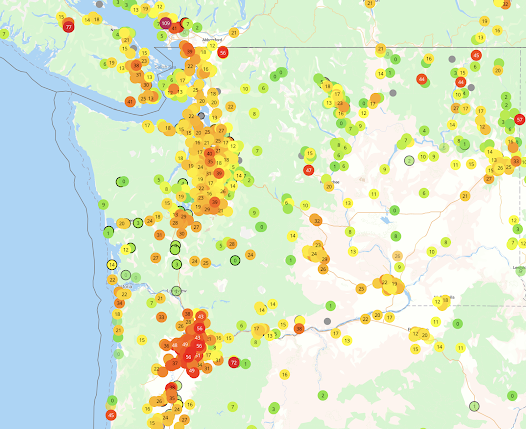It is perhaps ironic that when cool, cloudy air floods western Washington as it did yesterday, winds surge in eastern Washington, leading to the potential of rapid wildfire growth.
The visible satellite image this morning shows the situation.
Cool, dense, cloudy marine air has inundated western Washington and extends up the river valleys to the crest. If you look closely, you can also see smoke from the British Columbia fires extending over northeast Washington.
Yesterday, an upper-level trough (or low) moved through (see graphic at the 500hPa pressure level, about 18,000 ft), resulting in the energetic influx of marine air.

Looking at the observations above Seattle Tacoma Airport (time on x-axis, height on the y-axis), you can see major cooling in the temperatures (red lines in C) and a dramatic shift to moderate southerly winds below about 5000 ft.
The Cascades blocked most of the low-level cool air so that eastern Washington stayed warm. This sets up a pressure difference across the Cascades with cool, dense air to the west resulting in high pressure compared to the warmer eastern Washington. This is apparent in the sea-level pressure forecast for 5 PM Wednesday shown below (lines indicate pressure, shading shows temperatures in the lower atmosphere, yellow is colder).
The large pressure difference over the Cascades resulting in air accelerating over and down the crest and across the eastern slopes of the Cascades.
The maximum gusts observed yesterday along the eastern slopes of the Cascades (shown below) surged above 40 mph in many locations to a high of 56 mph north of Wenatchee.
And such winds were well forecast by the UW WRF weather prediction model (wind gusts at 11 AM Wednesday in knots shown below).
Such strong, gusty winds descending the eastern slopes of the Cascades can greatly enhance wildfires, causing them to blow up and spread quickly. The greatest danger is when the approaching trough initiates thunderstorms, with lightning starting fires, followed by strong winds that encourage fire growth.
Yesterday we were lucky, there was no lightning over the eastern slopes of the central Cascades, but there was a large grass fire of concern: the Batterman Road fire, which has spread to over 14,000 acres and is 50% contained.
Not much change during the next week in our weather. No rain in Washington, showers in BC, and no heatwave in sight.










Comments
Post a Comment